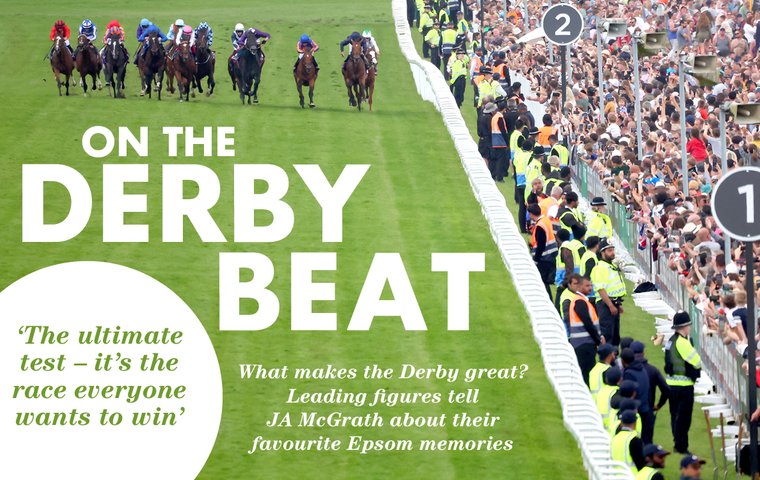
Derby greats tell JA McGrath why Epsom retains a special place in their affections – and why the race remains the world’s greatest Classic
Between t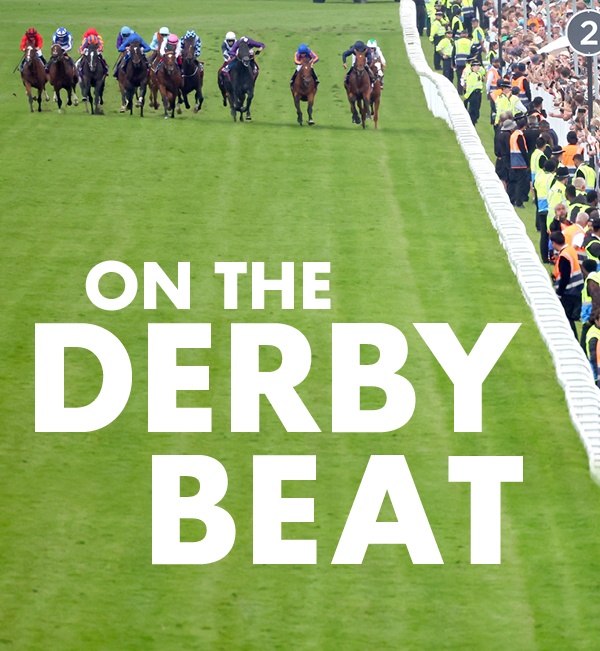 hem, they have won 35 Derbys – ten jockeys and trainers who can lay claim to being greats or soon-to-be greats of the Turf.
hem, they have won 35 Derbys – ten jockeys and trainers who can lay claim to being greats or soon-to-be greats of the Turf.
They boast enough collective wisdom to throw light on how and why this particular mile-and-a-half-race for three-year-olds with a 244-year history has been shaping the Thoroughbred for generations and still retains its relevance in an era dominated by speed.
The Derby, a unique test at a unique racecourse, has a magical quality that endures.
So we asked a selection of racing’s biggest names to explain what makes the Derby such a great race and to identify their own personal favourite Derby memory. Here’s what they had to say.
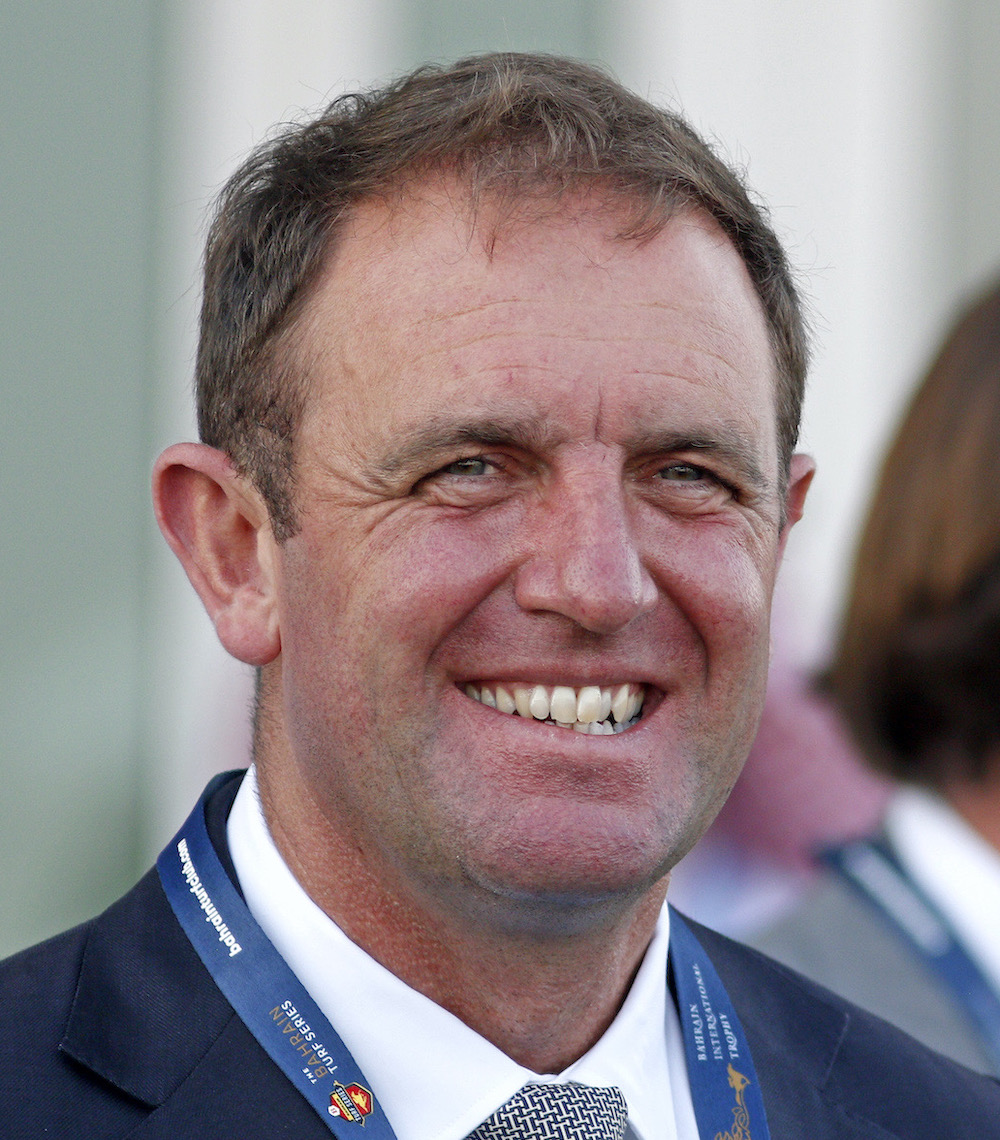 Charlie Appleby: Ultimate test for the middle-distance three-year-old
Charlie Appleby: Ultimate test for the middle-distance three-year-old
Derby winners: Masar (2018), Adayar (2021)
What makes the Derby great?
It’s the ultimate test for the middle-distance three-year-old. It’s like the Guineas, really. You are training them in the spring of their three-year-old career and you are stepping them up in trip where they haven’t ventured before. The biggest test is the actual track itself.
Then there’s all the razzamatazz, with the people there and the band playing. It tests the mental strength of any three-year-old as much as the physical strength.
What is your favourite Derby memory?
Winning our first Derby with Masar. The most memorable part of that was actually watching the race itself. So many times in our lifetime, we’ve watched races and you are never really comfortable until they have crossed the line.
But Masar’s Derby was one of those enjoyable races to watch where you were happy at every stage of the race with what the horse was going through. Once he struck the front, I was confident he wasn’t going to be passed. Thankfully, he kept on galloping.
The other memorable feature of the win was to have the Godolphin royal blue colours crossing the line in front in the Derby for the first time [Lammtarra in 1995 was a Godolphin winner but carried different colours]. It was a huge achievement by everybody and I felt very privileged to be in the position to deliver a horse such as Masar to win.
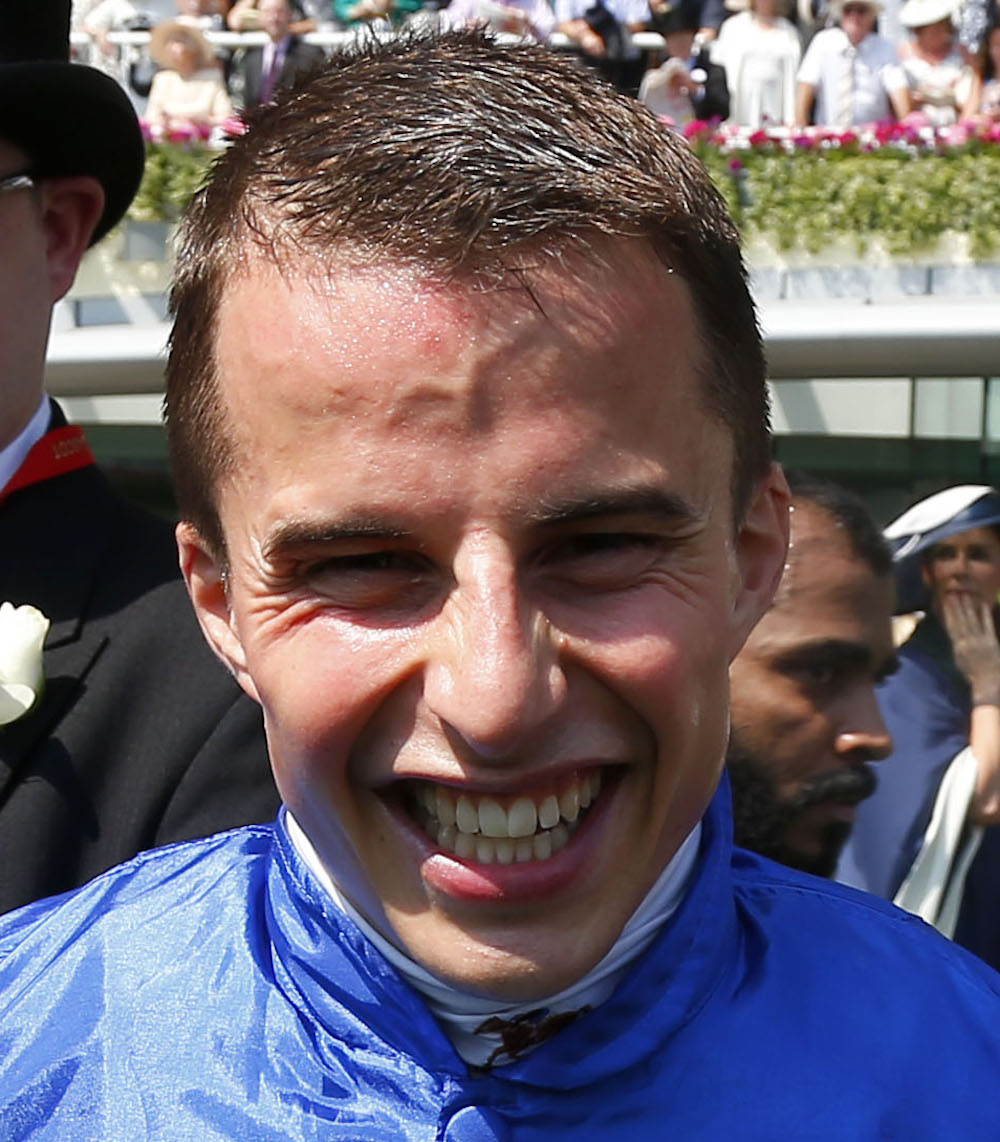 William Buick: Frankly, the whole day is a challenge
William Buick: Frankly, the whole day is a challenge
Masar (2018)
What makes the Derby great?
The Derby is great because of all the history and heritage it has. But for me personally, it is great because it is such a hard test for a three-year-old. The track poses a real challenge. Frankly, the whole day is a challenge, with the razzamatazz and all that goes with it.
Also, the timing of the Derby, where it comes in the calendar. Like the Kentucky Derby and other big three-year-old races, they usually come early in the season. That makes it extra difficult and more of a test. It’s special when you win because you really need a great horse who can do it all.
What is your favourite Derby memory?
When I won on Masar in 2018. I recalled being there at Epsom with my Dad for Sir Percy’s win – I had watched many Derbys on television but that was the first time I saw a Derby live. It was way before I started riding. I was only a young boy but I remember how special it was. Then, when I won the Derby myself on Masar, it was unbelievable.
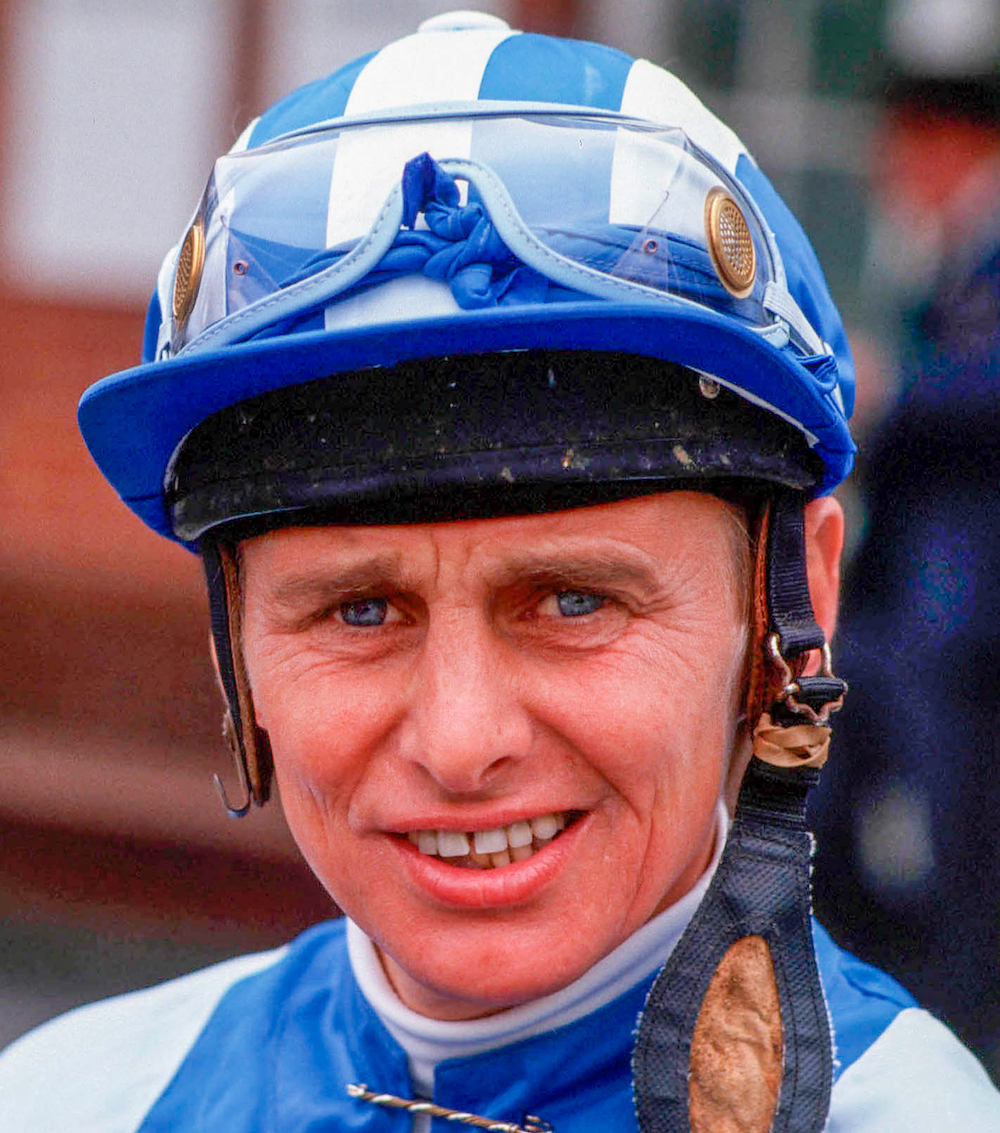 Willie Carson: Jockeys always go too fast in the Derby
Willie Carson: Jockeys always go too fast in the Derby
Troy (1979), Henbit (1980), Nashwan (1989), Erhaab (1994)
What makes the Derby great?
The Derby is the best test for potential stallions. Owners and trainers all want to run their best three-year-old colts in the Derby. Epsom, with its racecourse … if a bomb dropped on it, it would be flattened – and it would probably make it better!
It’s a great test of a three-year-old colt. The test starts normally with the parade, which you don’t have much of nowadays. Back in the day, you had to go through the gypsy encampment but not anymore.
The Derby is all to do with testing the Thoroughbred. The racecourse itself climbs 110 feet from the start to the highest point, near the seven-furlong marker, and from then on, the racetrack drops away from you and turns at the same time.
From the seven to Tattenham Corner, it’s a bit unnerving for an animal when he’s galloping and his feet are not hitting the ground when he is expecting them to. The ground is falling away from them all the time.
Then you’ve got the camber up the home straight. When they are tired, the camber pulls them towards the inside rail, which is another test.
What is your favourite Derby memory?
My favourite Derby memory is winning on Troy in 1979, because it was my first. But I must also mention Erhaab because, on a personal note, it was one of the best rides I could ever give a horse.
I was following Willie Ryan, who was riding Foyer for Michael Stoute, and he stumbled and ‘went’ right in front of me. Willie came out of the saddle like a bar of soap that had just been squeezed with slippery hands. I had to follow the loose horse for a while after that.
Jockeys always go too fast in the Derby. Everyone gets so revved up. It’s a very important race, a very big day. You can’t keep calm – or it’s hard to. I did in the end. Piggott always kept calm.
There’s pressure. My advice was always to unload the pressure onto somebody else. Don’t carry it with you.
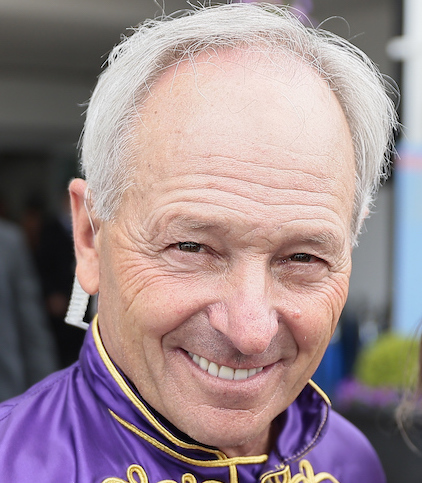 Steve Cauthen: The race everyone wants to win
Steve Cauthen: The race everyone wants to win
Slip Anchor (1985), Reference Point (1987)
What makes the Derby great?
The Derby is the race everyone wants to win. The historical factor is important – you look at all the great horses who have won it. Basically, it is the race. If you asked most people in the UK which race they would most like to win, it would be the Derby at Epsom.
Just like the Kentucky Derby, it has all the glamour, the fun of the day; it’s like a party. It’s not like the Melbourne Cup when the whole country stops, but people from other sports and other walks of life take notice of the race and who wins.
When your boss wants to win it, it becomes the focus. When I rode for Henry Cecil, Slip Anchor in 1985 was his first Derby win and it was important to all of us at Warren Place. All those things make it more pressure, and more special when you pull it off.
What is your favourite Derby memory?
Slip Anchor. After Lingfield and in the weeks leading up to the Derby, I was riding the horse out every day because I thought this was my best chance ever to win the Derby.
About three weeks out, I called my Dad and I said I want you to come over because I think I’ve got a good chance of winning the Derby.
The moment I remember most, after it was all over, was when we were all up in a room we had been invited to after the Derby. My Dad was there having a drink, and his face said it all. I could tell he was proud of me. That to me is what it’s all about.
My Dad was never one to hand out compliments. I had to work hard to get any compliment out of him, and the fact is he never really did say: “I’m proud of you.” But it was the look on his face. I knew he was. You could tell he was as proud as punch. It was really cool.
Slip Anchor was spot-on that day, and he loved the track. He was like a cat on wheels. I let him freewheel down the hill and by the time I got to the stretch, I looked around and I was 15 lengths clear. I just let him cruise.
Later, we were invited to the Royal Box. Her Majesty the Queen and Princess Anne were there and it was the first time I met Princess Diana.
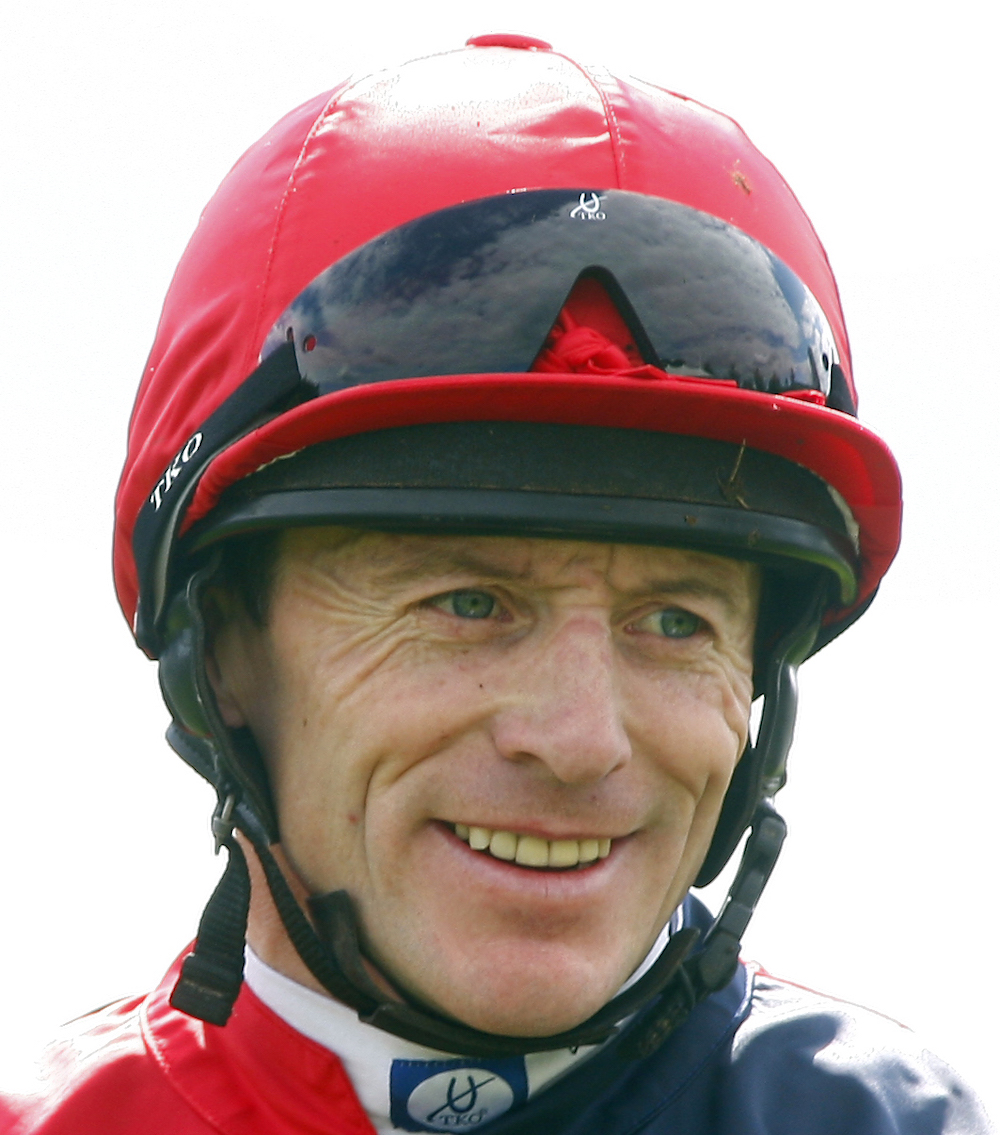 Kieren Fallon: Piggott was a one-off, a genius
Kieren Fallon: Piggott was a one-off, a genius
Oath (1999), Kris Kin (2003), North Light (2004)
What makes the Derby great?
It’s the history. It’s the greatest race of them all. It’s the contours of the track at Epsom and everything about the race, from the time you leave the parade ring to the time you get back to the winner’s enclosure, if you are lucky enough, because so many things can happen.
You have to go all the way around the track to the start. That’s the great thing about it, trying to get your horse to the start as calm as you can without using any energy. Many overdo it.
Then there is the riding. It’s probably the hardest race, the hardest track to ride, particularly over the mile-and-a-half distance, because you are going uphill for four furlongs to the top and having to judge the pace of the race.
It’s like playing chess against the track. You just can’t go there and let them roll. You have to pace yourself properly. You have to save ground, can’t be wide, you have to get the perfect position. You have to know when to kick.
So many things come into it on that track that don’t apply on other tracks. There is so much to take in and try to get inside your head. That’s why you don’t see many jockeys other than Lester Piggott dominating the Classics there.
Piggott was a one-off, a genius in every way – mentally, physically, he could master it better than anybody else. Many think that if you’ve got the best horse, you are going to win. It doesn’t work like that, not in the Derby at Epsom. We’ll never see another Piggott, I know we won’t.
What is your favourite Derby memory?
I’m not saying it’s my favourite memory but it’s one that keeps coming back to me time and again.
I will always remember Greville Starkey being slated for his ride on Dancing Brave when he finished second to Shahrastani in 1986. I know what happened to Dancing Brave – he got too far back because he was shuffled back, and when that happens you have to sit and suffer. Anyone who makes a mid-race move falls apart.
Soon after the start in the Derby, as you are climbing, you have two switchbacks (right, then left) and he got shuffled back. If he could have got a better position, it might have been different.
There was not a lot he could do. He had to settle his horse – and he didn’t know if he would stay a mile and a half – and he rode the best he could from where he was, but because he flew home, everybody said he should have won.
Greville Starkey was one of the greatest jockeys we had seen in a long time. He was in an era with the greats such as Pat Eddery, Lester Piggott and Willie Carson and it was the one blot on his copybook that everyone remembered. I thought he was treated badly in the reaction to that Derby ride.
My three Derby wins were all fairly easy really. North Light was push button – he was a good horse, as well, different class to the rest of the field. Oath was again push button, he travelled and quickened. And there was Kris Kin, his wasn’t a great Derby.
There was nothing actually exciting about any of mine, except that I was winning the Derby, of course.
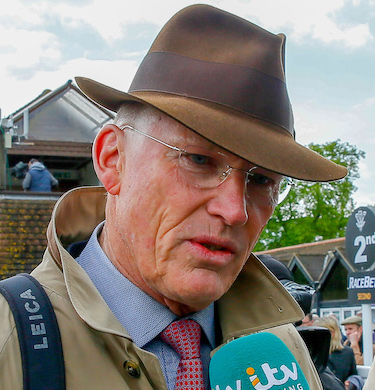 John Gosden: Lester wasn’t complaining after the race
John Gosden: Lester wasn’t complaining after the race
Benny The Dip (1997), Golden Horn (2015)
What makes the Derby great?
The Derby demands a lot of a horse. You have to stay, you have to have great balance, a good mind, agility – and the track rises, drops, and rises again at the finish. It is the ultimate test of a three-year-old at that time of the year, though I could argue the Kentucky Derby is too, at the time it comes. It’s a big ask for three-year-olds.
What is your favourite Derby memory?
Leading Lester [Piggott] down to the start on The Minstrel in 1977 when I was working for Vincent O’Brien. It was the year Lester tried to get on Blushing Groom, and couldn’t get on him because the Aga Khan kept Henri Samani on. So Lester didn’t think he had much chance. He got up and won the race, beating Hot Grove and Willie Carson.
I asked him after the race ‘how did you do?’ I was running up the hill, from the old paddock past the winning post and the Rubbing House pub. I didn’t know the result because I had been down at the start. My job was to lead The Minstrel to the start and to take the cotton wool out of his ears when we got there.
Lester looked at me with a big grin. I had led him down through the gypsy encampment – they were screaming and shouting, the horse was sweating like hell and Lester was complaining – but he wasn’t complaining after the race.
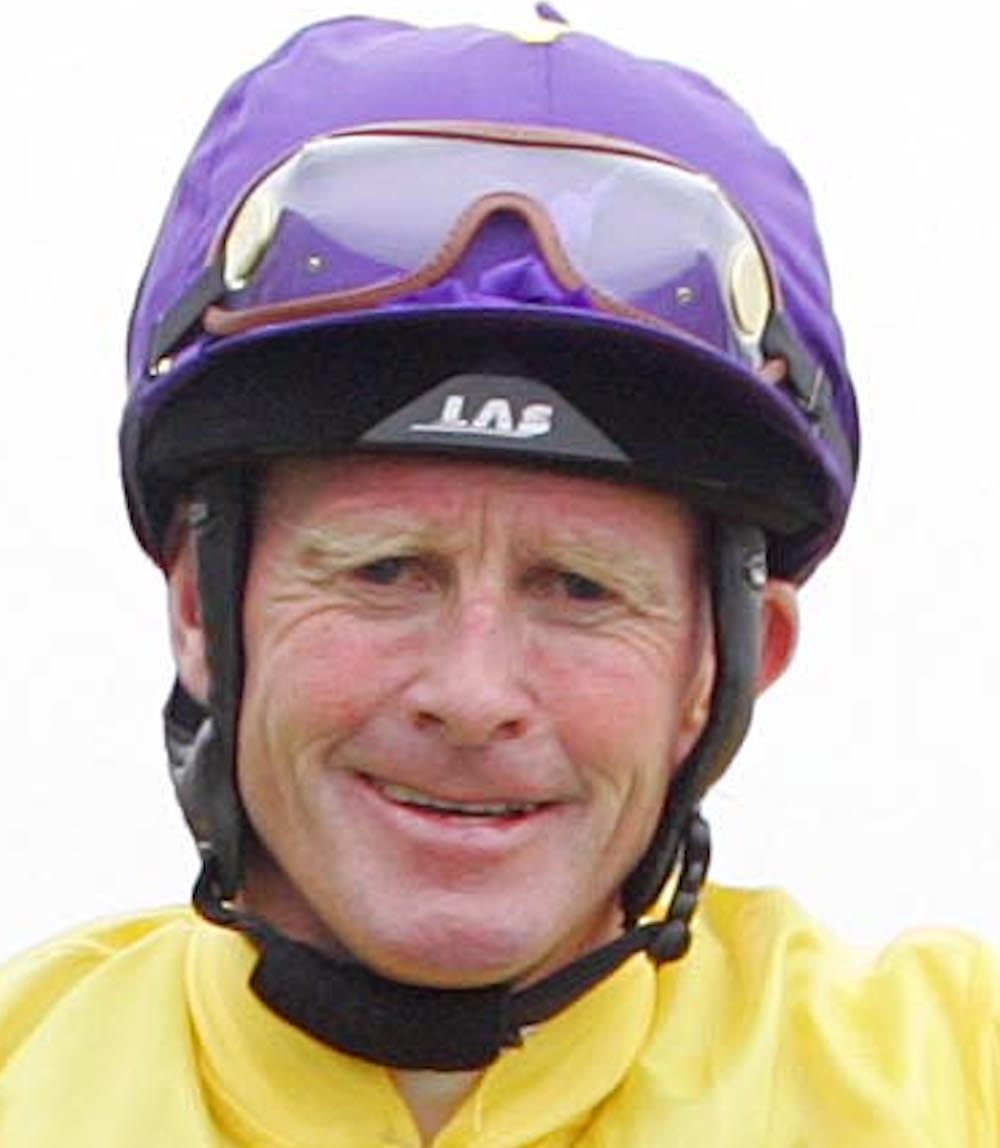 Mick Kinane: I knew Sea The Stars was my last throw of the dice
Mick Kinane: I knew Sea The Stars was my last throw of the dice
Commander In Chief (1993), Galileo (2001), Sea The Stars (2009)
What makes the Derby great?
The Derby asks everything of a horse and a jockey. He needs speed – and he needs balance and he needs courage. The jockey needs a bit of both. There’s no doubt, history and the breeding books says Epsom matters most to breeding. That’s the way I still view it.
What is your favourite Derby memory?
My favourite Derby memory is an old man being carried around by Sea The Stars. I just strapped myself on and that was it – all I had to do was not fall off him!
My second Derby winner Galileo was fantastic, a great horse. But the last one Sea The Stars meant so much, knowing it was my last throw of the dice. I trained hard during the winter because I knew I had to be supremely fit at 50 to compete. I made a conscious effort.
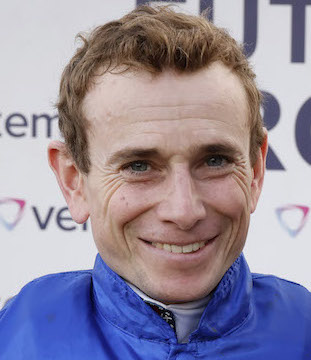 Ryan Moore: It’s the Derby – the Derby
Ryan Moore: It’s the Derby – the Derby
Workforce (2010), Ruler Of The World (2013), Auguste Rodin (2023)
What makes the Derby great?
It’s the Derby – the Derby. It’s the most important race of the year.
What is your favourite Derby memory?
From a personal view, winning my first Derby on Workforce, and riding in the Derby for the first time was a big thing as well [Unfurled, seventh to Motivator, 2005].
But I still have the vision of Galileo coming down the hill and the way he quickened over the road. Over time, you learn to appreciate what he was. His movement, his balance everything that he had on the day to win the Derby. As for handling Epsom … most of the good horses do.
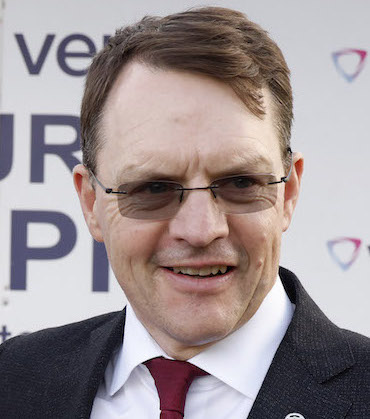 Aidan O’Brien: The Derby asks every question
Aidan O’Brien: The Derby asks every question
Galileo (2001), High Chaparral (2002), Camelot (2012), Ruler Of The World (2013), Australia (2014), Wings Of Eagles (2017), Anthony Van Dyck (2019), Serpentine (2020), Auguste Rodin (2023)
What makes the Derby great?
The Derby is the ultimate test of the Thoroughbred and is what every pedigree is measured on. The horse has to have speed, stamina, agility, mental strength, and it asks every question. Some horses don’t go forward from it because it is the ultimate test and it is very hard on horses. And that’s the way it has to be if the breed is going to be measured against it. It is the most important race run every year anywhere in the world.
What is your favourite Derby memory?
It has to be Galileo winning in 2001. Obviously our first Derby winner, very special for us and a first Derby winner for Sadler’s Wells – and what can you say about him, really? Then Camelot and Australia, which Joseph rode. They were incredibly special days. Every Derby is very special and any time we ever win, we consider ourselves very privileged and grateful to everybody for it.
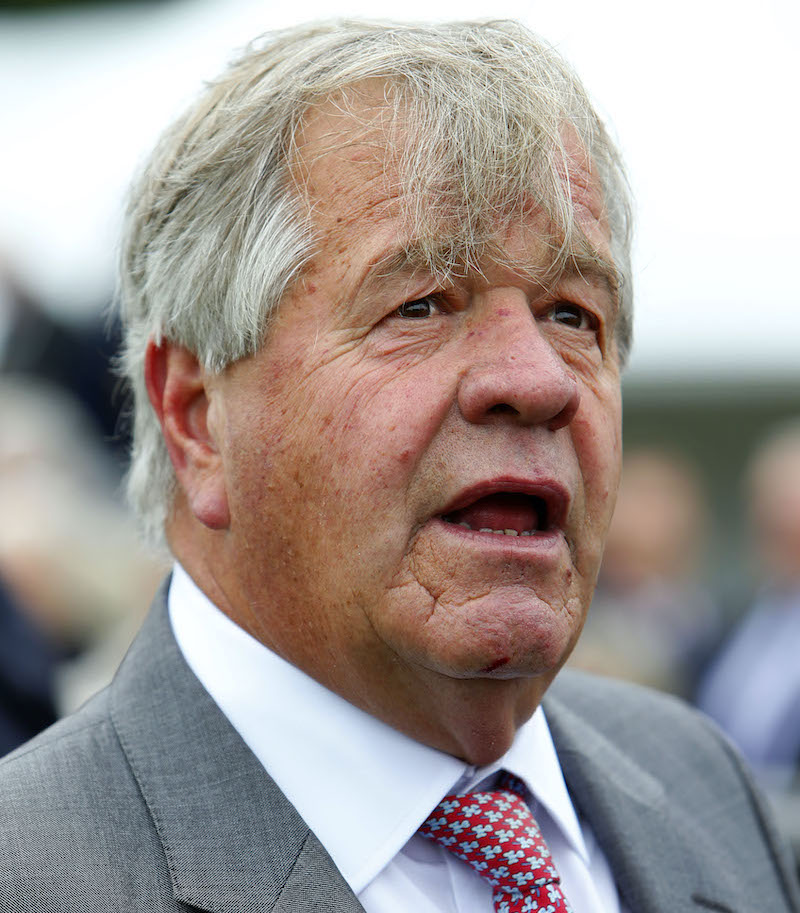 Sir Michael Stoute: Shergar was just a machine
Sir Michael Stoute: Shergar was just a machine
Shergar (1981), Shahrastani (1986), Kris Kin (2003), North Light (2004), Workforce (2010), Desert Crown (2022)
What makes the Derby great?
Number one: there’s the history of it. The track is very different to anywhere else. It’s very demanding on an equine athlete. I think it is a great test – up hill, down dale, very undulating. You need a good colt to be successful around Epsom.
What is your favourite Derby memory?
Every one of my Derby wins was very, very special; they were all very delightful. But my favourite Derby memory was my first: Shergar. He was so dominant, it was a wonderful day.
Shergar was just a machine. Confidence beforehand was high – it had to be with what he was doing in the trials, at Sandown [by 10 lengths] and in the Vase at Chester [by 12 lengths]. He won the Derby by 10 lengths.
• Visit the Betfred Derby Festival website
On the Derby Beat: Is the Derby at the end of the beginning – or the beginning of the end?
‘Epsom is not where the Jockey Club would like it to be’ – interview with general manager Tom Sammes
View the latest TRC Global Rankings for horses / jockeys / trainers / sires


